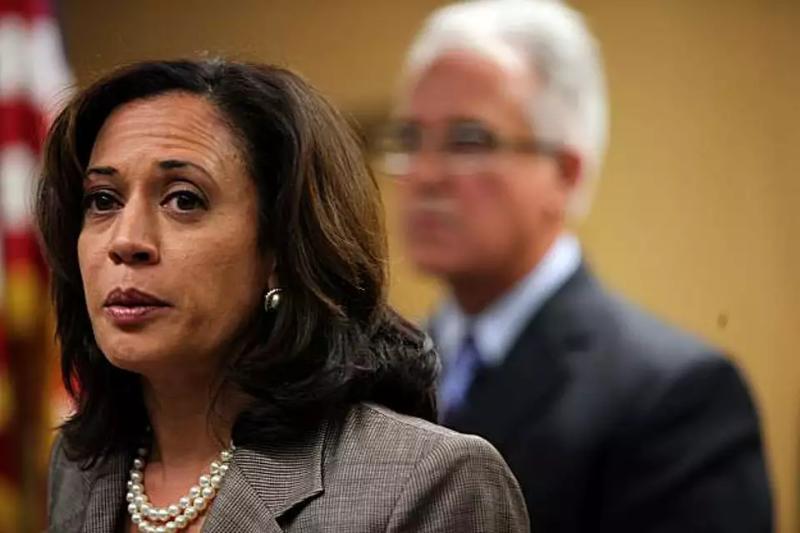Judge rips Harris' office for hiding problems
By: Jaxon Van Derbeken (SFGATE)


Lets' set the wayback machine for 2010. We find a bright, young District Attorney keen to embellish their resume by cutting corners to compete for political office. For a prosecutor, those pesky Constitutional rights are nothing of concern. A win is a win, after all.

San Francisco District Attorney Kamala Harris' office violated defendants' rights by hiding damaging information about a police drug lab technician and was indifferent to demands that it account for its failings, a judge declared Thursday.
Superior Court Judge Anne-Christine Massullo stopped short of granting a request by more than 40 drug defendants that their cases be dismissed because of prosecutorial misconduct, saying that decision must be left up to the judges hearing their cases.
But in a scathing ruling, the judge concluded that prosecutors had failed to fulfill their constitutional duty to tell defense attorneys about problems surrounding Deborah Madden, the now-retired technician at the heart of the cocaine-skimming scandal that led police to shut down the drug analysis section of their crime lab.
Prosecutors, unable to vouch for the reliability of Madden's work, have dismissed more than 600 drug cases since the scandal became public in February.
Madden testified at trials before leaving the lab in December. Under a 1963 U.S. Supreme Court ruling, district attorneys are obligated to hand over to the defense information about prosecution witnesses that could be used to challenge their credibility.
Domestic violence case
Madden was convicted of misdemeanor domestic violence in 2008, which should have been reported to defense lawyers. Last fall, Harris' lead drug prosecutor complained about Madden's unreliability in a memo to her bosses, information that was also wrongly kept from the defense, the judge found.
Police have admitted they erred in not telling prosecutors about Madden's conviction, and Harris' office has acknowledged that it relied on police to volunteer such information without checking her criminal record.
Massullo wrote that top drug prosecutor Sharon Woo's Nov. 19 memo about Madden showed that prosecutors "at the highest levels of the district attorney's office knew that Madden was not a dependable witness at trial and that there were serious concerns regarding the crime lab."
Woo wrote that crime lab officials believed Madden was unhappy in her job and was intentionally sabotaging the drug analysis unit. None of that, however, was conveyed to defense attorneys in cases in which Madden had analyzed drug evidence.
Violation of rights
The failure by Harris' office "to produce information actually in its possession regarding Madden and the crime lab is a violation of the defendants' constitutional rights," Massullo wrote.
She said Harris' office had the "duty to implement some type of procedure to secure and produce information relevant to Madden's criminal history." But Massullo said her repeated requests that prosecutors explain why they did not have such procedures were met with "a level of indifference."
Massullo refused the defendants' blanket motion to dismiss all their cases, saying each must be considered individually. Harris was not available for comment, but her spokeswoman, Erica Terry Derryck, seized on the judge's refusal to dismiss the charges as a victory and downplayed her criticisms.
"The bottom line," Derryck said in a statement, was whether the judge would drop all the cases at once. "She didn't. Not one case."
Working on reforms
She noted that "the law requires prosecutors to turn over information that they may not even have. In order to do that, we need the right policies and a real partnership with the police to make sure we have all the information we need. That's why we're instituting reforms to make sure this doesn't happen again."
Massullo was insistent that prosecutors get busy on disclosing witnesses' pasts. "Your office needs to comply," she told Woo in court. "You are responsible for figuring out how to do it."
Public Defender Jeff Adachi, whose office represents many of the defendants involved in Thursday's ruling, said Massullo's findings would provide ample ammunition when individual cases come before judges.
The ruling "really hits the ball out of the park," Adachi said, "by setting forth multiple failures by the district attorney to disclose evidence."




Kamala Harris didn't appear to be concerned with Constitutional rights when they were inconvenient for her career. Tell us again how Harris was tough on cartel gangs and migrant drug dealers.
The inconvenient truths are starting to be revealed.